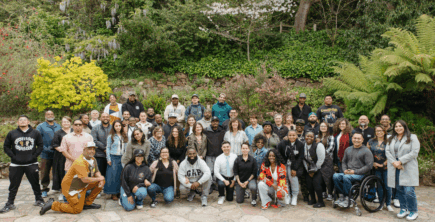
LGBT

The daunting task of curtailing greenhouse gas emissions to address climate change cannot be accomplished without concrete actions taken by the private sector. And in the digital age corporations rely on data to inform their decisions on “how” to reduce their carbon footprint. I’m excited to talk to Julie Kae, Executive Director of Qlik.org, to learn how Qlik, a Tides corporate partner since 2018, has been solving the data issue in combating climate change.

Qlik is a leading data analytics software company focused on driving impact at the intersection of business, society, and the environment. (Photo © Scott Graham)
For those who don’t know Qlik well, can you share who Qlik is and what you consider your social impact northstar as a company?
Qlik is a leading data analytics software company, and our focus has always been driven from leveraging our assets—people, products, culture—to drive impact at the intersection of business, society, and the environment. Our solutions are based on the unique strengths of our software products, which are capable of driving impact involving multiple stakeholders, and our culture is one to push the boundaries of what businesses are capable of. We do this by involving the entire Qlik organization, our customers, and partner ecosystem.
Before we delve into how the Qlik platform supports other companies’ efforts to get to carbon neutrality, it’s important to hear about Qlik’s own goals and strategy to address climate change. Can you talk about that for a moment?
Qlik has published our carbon footprint in our Sustainability Report for three years, and we have multiple programs to reduce our environmental impact supported by our global offices. Qlik also recently joined a group of other companies in the Race to Zero initiative created by Exponential Roadmap. As the main analytics partner of the United Nations since 2016, we expanded our partnership this year with the UNFCCC. Our partnership supports UNFCCC’s needs for analytics as well as a unique opportunity to jointly create apps and methodologies to support all business calculations of CO2 emissions. We make these apps publicly available to support the mission of the UNFCCC, while reaching tens of thousands of organizations in order to help them reduce their carbon footprint.
As any experienced corporate social impact practitioner knows, the commitment and investment by top leadership is crucial to the success of any social impact program. And for it to scale, you must also bring the entire employee base along for its broad support. How did those two pieces come together at Qlik?
Qlik intentionally created our social impact program in a way to involve all employees across the organization. We do not operate a separate team. The program receives the support of our executive leadership and private equity partner, Thoma Bravo, as a leader in their portfolio ESG metrics. All Qlik employees receive volunteer days and are encouraged to support the causes that are important to them at a local, regional, or global level. Philanthropy is very personal and we believe our employees should be able to support causes important to them, whether they be in development, humanitarian or natural disaster relief, medical research, cancer support, children’s hospitals, etc.

“We want everyone involved in the sustainability decisions for companies. Not just the experts on the climate or sustainability team, but everyone.” (Photo © Jarrett Tan)
Tell us more about the Qlik platform. How is it a game changer in helping companies get to carbon neutrality?
The Qlik apps we’ve built rely upon standard methodologies to help companies calculate their emissions and impact. Here’s the difference with our solutions, however: we are not a separate system or application that supports a sustainability team. We bring the environmental data to the decision maker in the app that they already use today. Everyone within an organization is responsible for managing the footprint, just like everyone is responsible for managing expenses. This approach creates collaboration across an organization and allows us to reach goals faster. And, our apps allow for forecasting. For example we can analyze “what will happen if we increase sales from this supplier,” and model what that carbon footprint impact will be to properly plan and account for the increase in order to act. In short, we want everyone involved in the sustainability decisions for companies. Not just the experts on the climate or sustainability team, but everyone.
How did the challenges of 2020 and their ripple effects impact this work? What did you do to mitigate those effects?
Qlik got involved very early in Covid-19 analysis applications based on the history of our work with the WHO, CDC, customers, and partners. Today, we are partnering with the World Bank and Asian Development Bank on vaccination planning tools, for example. This work over the past year was possible because of the unique strengths that Qlik brings with our software, which breaks down silos and connects multiple organizations together to solve problems. Our approach to Covid-19 is the same as our approach to climate change: we need everyone involved in the solutions. Everyone needs to play a role.
What’s next for Qlik? Anything exciting you’d like to share?
The initiatives coming out of this office will continue to focus on climate change, good health, opportunity, safety, and representation for all people everywhere on our planet.
We are expanding our partnership with the United Nations to encompass many new apps and initiatives, including support for a newly announced org UNITAC which will focus on sustainable development within cities. We will continue to support the hundreds of NGOs around the world in our program with our software and are working to migrate them all to Qlik SaaS to further their impact and reduce expenses related to maintaining hardware. All of our NGOs will map their data in Qlik apps to the UN SDGs. Furthermore, we’re going to bring all employees into the DE&I conversation by implementing a global strategy like we have for social impact and climate. Lastly, we’ve created the Office of Sustainability, which I am honoured to lead. The initiatives coming out of this office will continue to focus on climate change, good health, opportunity, safety, and representation for all people everywhere on our planet.

LGBT

Corporate Partners

Philanthropy

Read the stories and hear the voices of social change leaders fighting for justice.